The Top 9 Best Jazz Guitar Amplifiers
We may also earn commissions on purchases from other retail websites.
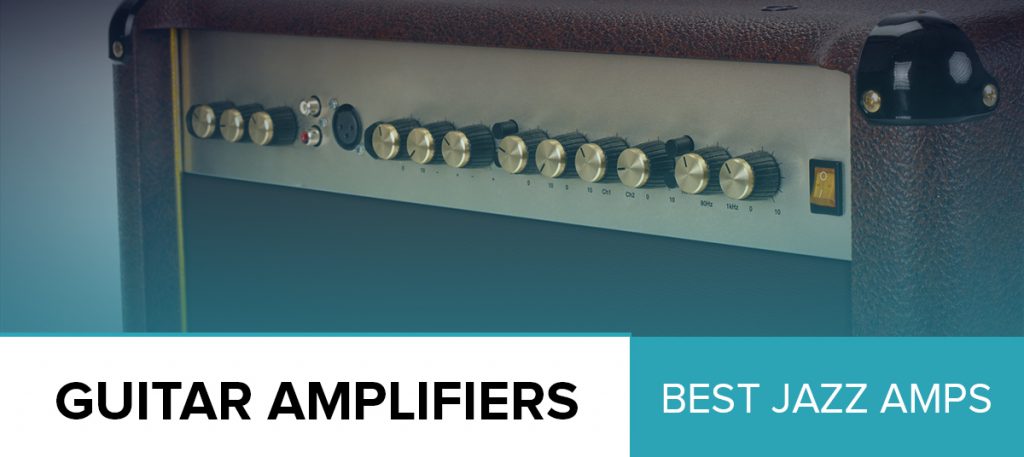
Last Updated: Apr-25-2019
In our first refresh of this jazz amp chart, we removed a few models, such as the Fender Champion 40. However, we also added some new amps worthy of some attention. These included the Fender Champion 50XL and the cute Vox MINI3 G2.
Jazz is all about tone and when it comes to jazz guitar – whether you are comping or blowing – the key to the best tone is in your amplifier. While selecting the best jazz guitar for your style is crucial, having the right kind of amplifier is just as important.
This is why, in this article, we are looking at jazz amps in closer detail. The chart below features some of our favorite jazz guitar amps on the market today, while you can read more about them in their individual reviews. We also take a look at what you should consider when shopping for a jazz amp.By the end of it, you should be able to confidently determine which is the best amplifier for your jazz playing.
In the following chart we are looking at amps with varying prices and wattages, although if you see a 100-watt amp you love the look of – but either find too powerful or too expensive – chances are the brand offer a lower-priced version of the same amp, with similar tonal features but a lower wattage. Have a browse – you’ll be surprised at what you can find!
The Top 9 Best Jazz Guitar Amplifiers
| Image | Guitar Amplifier / Rating | Summary | Check Price |
|---|---|---|---|
+ -  | Roland JC-120 Jazz Chorus Total of 4.72/5 | A higher-end jazz legend with beastly power and tone. | |
+ - 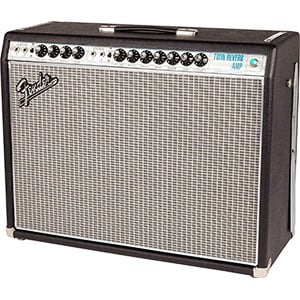 | Fender ’68 Custom Twin Reverb Total of 4.72/5 | Huge power and clarity from a tribute to a Fender legend. | |
+ - 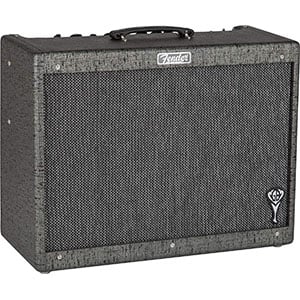 | Fender George Benson Hot Rod Deluxe Total of 4.78/5 | Tons of soul from an amp inspired by a jazz guitar icon! | |
+ -  | Fender '65 Princeton Reverb Total of 4.67/5 | A higher-end jazz legend with beastly power and tone. | |
+ -  | AER Compact 60 Total of 4.85/5 | This acoustic amp offers clinical levels of transparency. | |
+ -  | Roland AC-60 Total of 4.70/5 | A solid acoustic amp for jazz that works well for small gigs. | |
+ -  | Fender Champion 40 Total of 4.70/5 | A 40-watt combo amp with a sweet clean tone. | |
+ - 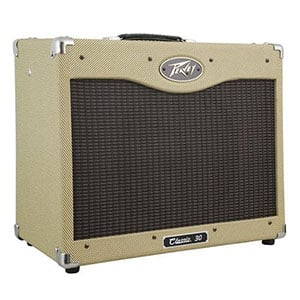 | Peavey Classic 30 Total of 4.67/5 | Sweet jazz tones and more with this cool vintage combo. | |
+ - 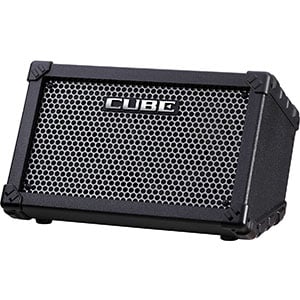 | Roland Cube Street Total of 4.72/5 | Worth considering for jazz guitarists on the move! | |
+ -  | Roland Micro Cube GX Total of 4.85/5 | An affordable and portable amp with good jazz cleans. |
Roland JC-120 Jazz Chorus
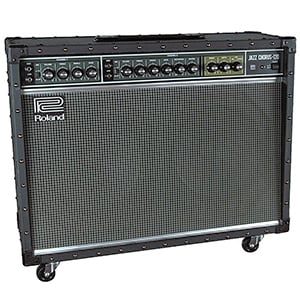
| Controls: |  |
| Features: |  |
| Performance: |  |
| Value: |  |
There may be no surprise to see that the legendary JC-120 from Roland is kicking off this list! Part of Roland’s iconic Jazz Chorus collection, this beastly two-channel solid-state amplifier offers huge power and a sensational clean tone.
Featuring a no-nonsense retro look and versatile controls, this amp is loaded with two 60-watt power amps hooked up to two individual 12” speakers, leading to a huge 120-watts of power. For jazz guitar, the cleans are to die for and crystal clear, giving you a blank canvas on which to work.
With such power and heft, it will be complete overkill for most casual jazz guitarists, but we love it! You can read more in the Roland JC-120’s full review.
Fender ’68 Custom Twin Reverb

| Controls: |  |
| Features: |  |
| Performance: |  |
| Value: |  |
Next on this top ten list is a powerful high-end amplifier that is adored by jazz guitarists around the world for good reason!
As we highlight in the complete ’68 Custom Twin Reverb review, this all-tube combo amplifier – a tribute to the look and sound of the late ‘60s Silverface amps – is a handy tool for professionals and stage musicians, cutting through any mix with ease.
With exceptional circuitry and build quality, this amp is incredibly clean, powerful and articulate, giving superb clarity even at high volumes. In fact, with two 12” speakers and 85 watts of power, there’s more volume on offer than most jazz guitarists will know what to do with!
Fender George Benson Hot Rod Deluxe

| Controls: |  |
| Features: |  |
| Performance: |  |
| Value: |  |
There are few names more famous in jazz guitar than George Benson and the charismatic American guitarist has put his name to this awesome jazz Hot Rod from Fender.
But it was more than simply slapping his logo on the front of the grille. George contributed ideas to the design and development of this lightweight all-tube combo, while also influencing the cool urban aesthetics.
With a great selection of tubes and a single 12” Jensen C12K speaker, this amp sounds amazing – perfect for jazz, with an organic, warm tone that retains its clarity as the volume increases. We have more on the George Benson Hot Rod Deluxe in the complete review.
Fender '65 Princeton Reverb
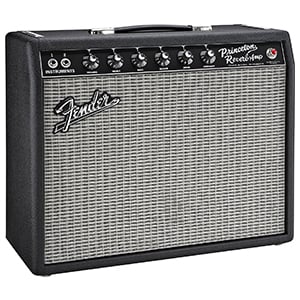
| Controls: |  |
| Features: |  |
| Performance: |  |
| Value: |  |
Three Fenders in a row? Well, the iconic American brand does make a great jazz amp! The ’65 Princeton Reverb is another tube sensation, with a clean sound that lends itself very nicely for jazz, as well as other styles.
As we highlight in our complete ’65 Princeton Reverb review, this is a revamp of a complete legend, and retains the charm that made the original so popular.
It’s a 15-watt combo amp that’s great for practice, studio recording and even small gigs. The clean tone is warm, clear and fat, and offers very good headroom, allowing you to increase the volume before it starts to break up (usually around 5 to 6).
AER Compact 60
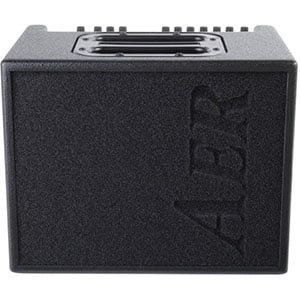
| Controls: |  |
| Features: |  |
| Performance: |  |
| Value: |  |
We arrive at a bit of a wildcard on this list, as the AER Compact 60 is actually an acoustic guitar amp. However, because of this it makes a very suitable jazz amp – as hundreds of jazz guitarists can testify.
The thinking behind this is that acoustic amps don’t color the sound in any way, leading to a clean and natural tone. The AER Compact 60 is one of the most popular acoustic amps out there, so it makes sense that it performs well for jazz.
While it lacks a little warmth, the clinical levels of clarity make up for it and you will never have to fear distortion again! Intrigued? Read more on the AER Compact 60 in the full review.
Roland AC-60
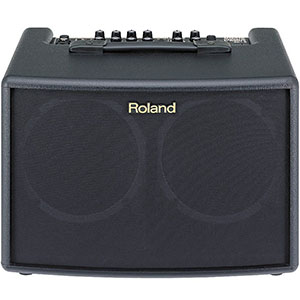
| Controls: |  |
| Features: |  |
| Performance: |  |
| Value: |  |
While we are at it, we have decided to include another very solid acoustic guitar amp that is well worth considering for jazz guitar – Roland’s AC-60.
As we discuss further in the full AC-60 review, this impressive combo amp features two 6.5” 30-watt speakers that deliver 60 watts of power. Combined with some of the extra features – like the tilt-stand, mute button and mic input – this amp lends itself very well to small club gigs.
Jazz guitarists will enjoy the crispness and clarity on offer in the tone. Perhaps it’s not as transparent or clinical as the above AER Compact 30, but it remains incredibly clean with a little more warmth.
Fender Champion 40
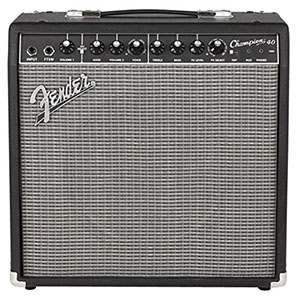
| Controls: |  |
| Features: |  |
| Performance: |  |
| Value: |  |
Another Fender to make this list is a modern classic – the Champion, in its 40-watt iteration. This solid-state combo amp is a popular choice with jazz guitarists and proves a very wallet-friendly solution.
The single 12” speaker and the 40-watts of power make it a smart choice for practice and smaller gigs, with the amp remaining crystal clear even when you crank up the volume. While it doesn’t have the soul of a Twin Reverb, the clean tone is pretty sweet and you will find it very easy to dial in a great jazz tone.
As always, you can check out our complete review of the Fender Champion 40 for more details on this cool little jazz amp.
Peavey Classic 30

| Controls: |  |
| Features: |  |
| Performance: |  |
| Value: |  |
There was no way this list would be complete without a Peavey amp and, even though the iconic American brand is best known for its heavy-metal amps, the Classic 30 certainly proves the guys at Peavey can produce something suitable for jazz too!
With cool vintage tweed aesthetics and a rugged build, this combo features seven tubes and a 12” Celestion Midnight 60 speaker for great headroom, as we highlight in the full Classic 30 breakdown.
The clean tone is excellent for jazz, with great response and lovey warmth. However, it can get pretty juicy for blues and more aggressive styles too – so if you dabble in a bit of everything, this is a solid consideration.
Roland Cube Street

| Controls: |  |
| Features: |  |
| Performance: |  |
| Value: |  |
While we have featured some pretty powerful amplifiers on this list, this solid-state combo from amp legends Roland is worth considering for both practice and small performance.
You don’t necessarily have to take it out on the streets, but the fact that it is battery powered does help! With two high-performance 6.5” neodymium speakers offering 5 watts of power, there is enough volume on offer for small performances.
With 8 COSM amp models, it has plenty of tone for all styles, but it caters well for jazz with very clear cleans and a transparency that hold up well for this style. There is more on this amp in the Roland Street Cube full review.
Roland Micro Cube GX
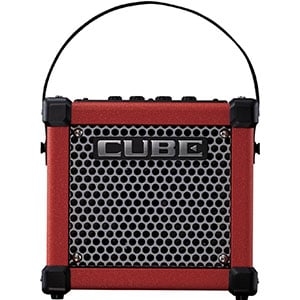
| Controls: |  |
| Features: |  |
| Performance: |  |
| Value: |  |
Another cool little amp that follows on from the Roland Cube Street is this Micro Cube GX, which offers incredible portability and a great solution for jazz guitarists on a budget.
With a snazzy compact build, available in a range of colors, the Micro Cube features a single 5” speaker and 2 watts of power, which is more than enough for practice. The cleans are surprisingly great for jazz, while 8 COSM amp models and solid controls make it versatile for other styles.
Extras, such as the built-in chromatic tuner and ability to connect to iOS, make it feel like great value. Our full review of the Roland Micro Cube GX has all the details!
What to Look for in a Jazz Guitar Amplifier
Whether you are a seasoned pro or a complete beginner to jazz guitar, you should know by now that jazz guitar is built on a clean, transparent sound. Unlike blues amps or metal amps, where some grit and distortion is what’s important, jazz musicians like things pristine, warm and smooth! Therefore, a good jazz amp will naturally be one that offers a clear, flat tone with a great dynamic response.
As the chart above proves, you can find good jazz tone through both solid-state and tube amplifiers… but which style is better?
In the past, solid-state amps have been criticized for their clean channels but, in 2019, most decent solid-state amps have excellent clean channels, offering a natural tone and crystal clarity. In fact, many jazz guitarists prefer the near clinical levels of clarity that solid-state amps offer.
On the other hand, tube amplifiers – which are traditionally seen as superior amps – have their own benefits. Most notably that they offer such a sweet, warm tone that remains clear, while also responding incredibly well to the player’s dynamics. The main disadvantage of using tube amps for jazz – besides being expensive, heavy and more work to maintain – is that the sound begins to distort as you reach a certain volume. As we’ve discussed, this is great for blues and rock guitarists, not so desirable for jazz.
To solve this problem, many jazz guitarists buy a tube amp with a higher wattage than they would regularly use. This offers more headroom, resulting in more clean volume. Others will buy an amp with a lower wattage, then simply modify it by replacing the tubes to gain more headroom.
You can read more about the pros and cons of tube amplifiers and solid-state amps, although what you go for will ultimately depend on your budget, current skill level and intended uses (practice, studio, and/or stage).
Elsewhere, you will also want to consider things like the controls. Do you like to endlessly tweak your sound? If so, aiming for something with a larger control panel (which usually means more power and a bigger price tag) will be sensible.
Also, you will want to consider where you are playing it. Are you taking it to different venues on a regular basis? If so, perhaps large, heavy and delicate tube amps aren’t ideal for this purpose, and you may want to go for a lighter combo amp or a tube amp head, which you can connect to an external speaker.
If you are only ever going to play through your amp in your bedroom or living room, don’t go and buy an 80-watt tube amp. Something this overpowered may look cool, but it’s pretty pointless as a lot of tube amps don’t sound their best when on volume level 0.5 to 1. Make sure to consider the size and output of the amp before buying.
Finally, on that note, if you are planning on playing quietly – whether practicing in an apartment or noodling late at night – a headphone connection will be a very worthwhile consideration (unless your neighbors LOVE jazz guitar at 3am)!
The Final Word
As you have seen, there is a wide world of suitable jazz amplifiers out there, although there is no one single ‘perfect jazz amp’ – it’s up to you to decide that. Consider your aims and budget, then go from there. Try out a few amps in your local guitar store or, if that’s not feasible, read some reviews and watch some videos online before making your final decision. Good luck!

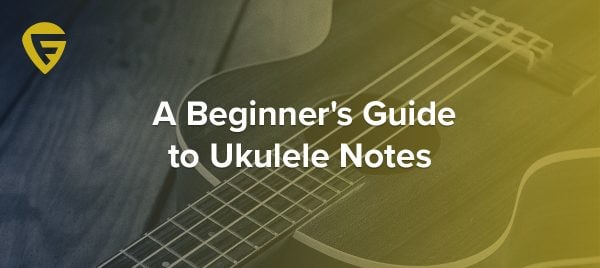
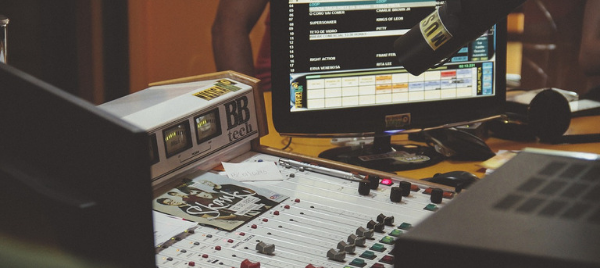
Reader Interactions